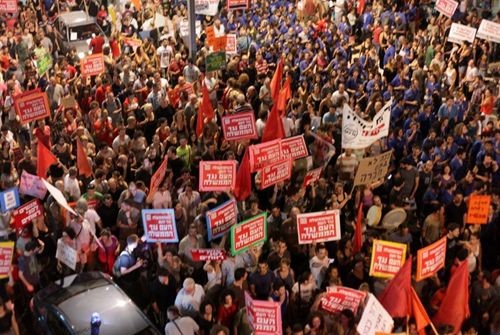A full year has passed since the start of the social protests – and the struggle continues. There are those who maintained that, in light of the demonstrations of hundreds of thousands of protestors, the rightist government “will get the message” and will eventually come towards the demands of the masses for social justice and for a change of priorities in the state budget. But a year has passed and the government has not budged: it still stands alongside the tycoons. Netanyahu and his ministers, the opposition from a year ago led by Tzipi Livni and Shaul Mofaz, the entire political establishment is running to embrace the social protest. But their embrace was so strong that it was transformed into suffocation and diversion. After a year of protest it is clear that the government is not even capable of implementing the conclusions of the Trajtenberg Committee, which the government itself set up, to give at least a partial answer to the demands of the protestors. Thus, the illusion that it is somehow possible to advance an “apolitical” protest has been shattered to bits. The protest, whose slogan “The people demand social justice” is inherently political, and is directed against the government ruling for the benefit of the tycoons.

Hadash activists carrying red flags and red banners during the massive Israeli social protest, July 2011 (Photo: Al Ittihad)
The Communist Party of Israel (CPI) and its partners in Hadash (The Democratic Front for Peace and Equality) salute the mass social protest of the summer of 2011 which came in the wake of a number of class struggles: the long and important strikes of the social workers, of the doctors, and of the railway workers against privatization; the wave of efforts to organize workers in factories and private companies, as well as in the public sector; the campaigns against the privatization of the public services – education, health, and welfare – for public housing and for larger social-sector budgets. The CPI congratulates it members and activists from Hadash who are playing such central roles in the protest.
The government of the political and social right lead by Netanyahu is combining the trampling of worker rights with its insistence on expanding the settlements in the occupied territories, initiating continuous military provocations, and its refusal of peace for land. In this way the government is running the risk of embroiling the people in Israel in yet another unnecessary war. Anyone who maintains that it’s possible to struggle against this rightist government only on the “social plain”, without fighting for democracy and against the occupation, is guilty of the very same mistake as those who believe that the social protest can be “apolitical”.
The CPI emphasizes once again that an Israeli-Palestinian peace is an absolutely necessary condition for advancing the cause of social justice; such a peace includes: evacuation of all Israeli settlements and withdrawal from all the territories conquered in June 1967; establishment of a Palestinian state with its capital in East Jerusalem, alongside Israel; and solution to the refugee problem in accord with UN decisions. Experience shows that there are close ties between the struggle for a just peace and a popular campaign for social justice.
The rightist factions in the government are exploiting the disgrace of social polarization and economic hardship on the one hand and the still unresolved national conflict on the other to exacerbate racist and anti-democratic tensions and to pave the way for a regime having fascist-like characteristics. Towards this end the government makes use of racist and anti-democratic legislation passed by the Knesset; the forcing of Arab residents off their lands (like the repeated destructions carried on at the Bedouin village of Al-Araqib in the Negev); the use of violence to break up demonstrations; the conducting of intimidating investigations of social activists; and destruction of homes and threats to transfer the Arab population in the Negev.
The CPI warns that continuation of the occupation, the perpetuation of discrimination and fueling of national hatred against Arab citizens, and the directing of racism towards migrant workers and refugees, whose fruits – increased racists attitudes and behavior among Jewish youth – intensify the dangers to the democratic space in Israel. The CPI calls for the strengthening of the Jewish-Arab nature of the social protest.
Partnership in the struggle between Jews and Arabs, between women and men is vital for the campaigns for social justice and the defense of democracy, for equality of civil rights, for national rights for the Arab-Palestinian minority in Israel, for equality of women and against any manifestation of racism or discrimination.
* Statement by the Political Bureau of the Communist Party of Israel (CPI)


